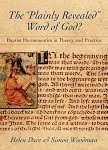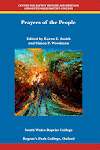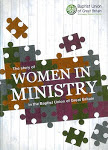A couple of reviews of my Revelation book have come my way in recent weeks; so here they are for posterity:
The Epworth Review, July 2009Revelation is a passionate book, which over the centuries has evoked a passionate, and sometimes dangerously unbalanced, enthusiasm in its readers. Simon Woodman is a self-confessed enthusiast about Revelation, but his enthusiasm is informed by a meticulous scholarship and a clear wish to allow his readers to draw their own conclusions. Woodman is a skilled teacher (he is a tutor at a Baptist theological college), and he is an excellent guide to what remains for many readers of the Bible unexplored territory.
The Book of Revelation has been written with second- and third-year university students in mind, and has a wealth of footnotes as well as diagrams and tables, but its lively and accessible style, and its concern with today’s context, makes it an engaging read also for the non-specialist reader.
After three relatively short introductory chapters, the book’s central section is entitled ‘Meeting the Characters’, in which the dramatic character of Revelation and the interplay between heaven and earth as the scene of action, is well presented. A final section, ‘Engaging the Imagery’, takes the reader through the whole of Revelation; its thematic headings (‘Heaven’s perspective on . . . the church, prayer, history’ and so on ) do not do justice to Revelation’s very complex structure, but the text contains a wealth of useful commentary material.
Woodman is aware that not everyone shares his enthusiasm for Revelation, and though his usual method is to present the evidence and leave his readers to assess it for themselves, he does seek to defend Revelation against those who have found its lurid descriptions of judgement offensive. His argument that these passages represent a cry for deliverance rather than for vengeance is largely convincing, although some readers will not be wholly convinced that Woodman has dealt adequately with the difficult idea of ‘the wrath of the Lamb’ or Revelation’s apparent delight in retribution when oppressors are ‘given . . . blood to drink. It is their due!’
Overall, however, this book is to be warmly commended. It is well written. It is a mine of information for preachers and for students. And it consistently encourages us to decide how we respond to Revelation’s vision.
Christina Le Moignan.Regent's Reviews, October 2009The Apocalypse of John is not the kind of text that gives the impression of being in need of protection. The work’s rhetorical mode is quite clearly one of confident assertion in relation to ‘what must take place’ (4.1). Letter and vision, prophecy and apocalypse, image and metaphor all combine in this work by ‘pounding its audience with image after image, special effect after special effect. And in so doing, it seeks to transform the way they look at the world in which they live.’
But Revelation does need some interpretative protection, and Simon Woodman, who understands this text so well, whether as an ancient apocalypse, formative influence on subsequent church history or ongoing resource for theological reflection, is an excellent guide to its use and misuse. In short, in this volume he provides an excellent, accessible guide to anyone who wishes to engage in detailed study of this complex text.
The book is divided into three sections. The first part offers an orientation to Revelation as a whole. Woodman skilfully and with enviable brevity steers the reader through the basic terrain of scholarship: what kind of text is Revelation? What are the most appropriate ways if interpreting it? How do we make sense of its main structural features? For those who need it, there is a clear account of the possible relationship of Revelation to human history. The following chapter, turns into an excellent summary of the whole work in which Woodman helps us to discern the role of the narrator in the text.
Section 2 is perhaps the most creative part of the work. Woodman suggests that greater attention to the main characters in the heavenly drama portrayed in Revelation will help us discern its central themes. In this he largely succeeds, and anyone looking for a structure around which they might develop four sermons on Revelation, could do a lot worse than work with the material in these chapters. The chapter on the ‘Forces of Evil’ should be required reading by anyone who claims to understand the identity of the beast!
Section 3 picks up themes from Revelation that Woodman believes are relevant to issues of contemporary discipleship. The counter-imperial identity of the Church, perspectives on economic and environmental questions, and the challenge of martyrdom are all explored sensitively and with one eye on the present challenges facing the church. If I have a criticism, it is that Woodman does not directly address the issue of violence in Revelation, although there are comments that implicitly suggest potential ways of treating that thorny issue hermeneutically.
In that as in other areas that are discussed in his lively, helpful treatment, Revelation does need some protection. Too often it has been used to prop up notions of divine action, prophetic activity, historical description and Christian mission that take no account of its contextual location in the fraught world of the earliest Christian movement, and in the fascinating genre of literature that we call apocalyptic. Through a mixture of careful scholarship and engagement with contemporary culture Woodman manages to offer the reader an invaluable guide, and to offset in the text much of the interpretative protection that it needs.
Sean Winter, Uniting Church Theological, College, MelbourneRegent's Reviews, October 2009We are fortunate indeed that Baptist scholars are in the forefront of recent writing on the Book of Revelation. Alongside Simon Woodman’s fine SCM ‘Core Text’ volume, we now have Stephen Finamore’s book based on his doctoral thesis on Girard and the Apocalypse. . .
Rob Ellis, Regent's Park College



































